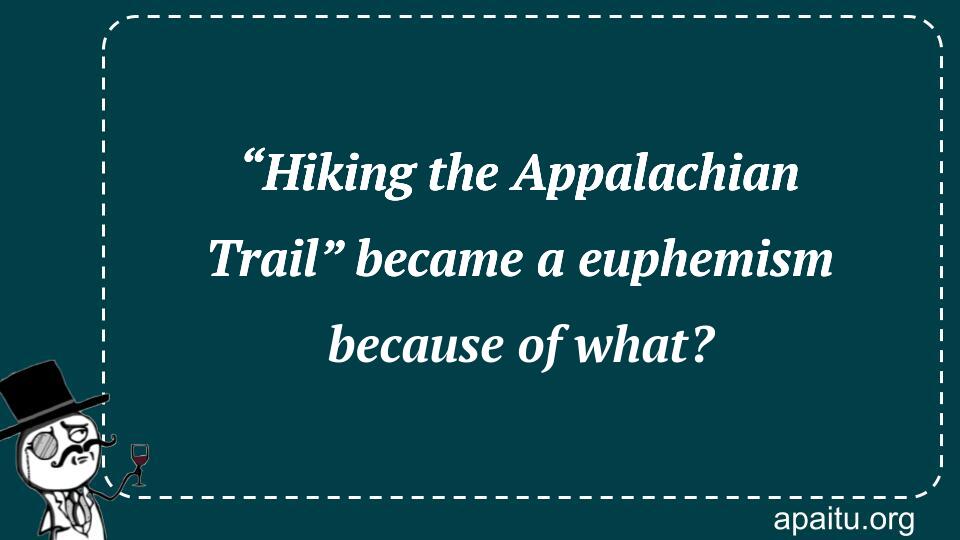Question
Here is the question : “HIKING THE APPALACHIAN TRAIL” BECAME A EUPHEMISM BECAUSE OF WHAT?
Option
Here is the option for the question :
- A UFO mystery
- An alternative lifestyle movement
- A political scandal
- A student protest
The Answer:
And, the answer for the the question is :
Explanation:
When South Carolina Governor Mark Sanford went AWOL for a few days in 2009, his staff claimed he was ‘hiking the Appalachian Trail.’ He was actually in Argentina visiting his girlfriend, which caused a political uproar because he was married at the time. ‘Hiking the Appalachian Trail’ is now seen as a metaphor for infidelity.

The phrase “Hiking the Appalachian Trail” has become a euphemism that carries a deeper meaning due to a political scandal. This euphemism gained prominence in the public lexicon as a result of a high-profile incident involving a politician, showcasing how language can be used to allude to something other than its literal interpretation. The scandal that led to the euphemism’s adoption captured the attention of the media and the public, ultimately shaping the way people refer to secretive or deceptive behavior.
The origins of the euphemism can be traced back to 2009 when Mark Sanford, the governor of South Carolina at the time, disappeared from public view. Initially, his absence was attributed to him hiking the Appalachian Trail, a plausible explanation given the trail’s popularity among outdoor enthusiasts and nature lovers. However, it was soon revealed that Sanford had not been hiking at all but had instead embarked on a secret trip to Argentina to visit a woman with whom he was having an extramarital affair.
The revelation of Sanford’s infidelity and the subsequent media coverage surrounding the scandal thrust the phrase “Hiking the Appalachian Trail” into the spotlight. The euphemism gained traction as a way to refer to clandestine or deceptive activities, particularly those involving romantic affairs or dishonesty. It became a shorthand way of alluding to situations where individuals claimed to be engaged in one activity while actually being involved in something entirely different.
The adoption of this euphemism highlights the power of language and its ability to shape public discourse. By associating the phrase with a prominent political scandal, it took on a new layer of meaning that extended beyond its literal interpretation. It allowed individuals to discuss sensitive or scandalous matters indirectly, often in a lighthearted or humorous manner, while still conveying the underlying message.
The use of euphemisms in language is not uncommon. They serve as a way to soften or mask the true nature of a situation, often used in discussions that involve sensitive topics or societal taboos. In the case of “Hiking the Appalachian Trail,” the euphemism became a widely recognized reference to dishonesty or illicit behavior, entering the cultural lexicon and demonstrating the lasting impact of a political scandal on language.
It is important to note that the adoption of this euphemism does not diminish the significance of the Appalachian Trail itself. The trail remains a celebrated and cherished destination for outdoor enthusiasts, offering a unique opportunity to connect with nature and embark on a transformative journey. The association of the euphemism with the trail is merely a reflection of the scandal’s impact on popular culture and the dynamic nature of language.
the phrase “Hiking the Appalachian Trail” transformed into a euphemism due to a political scandal involving Mark Sanford, the former governor of South Carolina. The scandal revealed his extramarital affair and his deceptive trip to Argentina, which diverged from the literal interpretation of hiking the renowned trail. The adoption of this euphemism demonstrates how language evolves and how a single event can shape the way people refer to secretive or dishonest behavior.